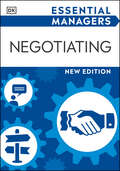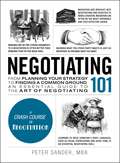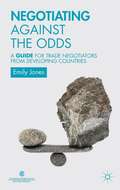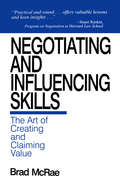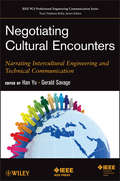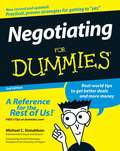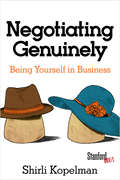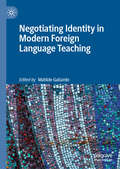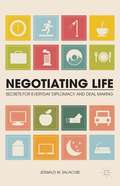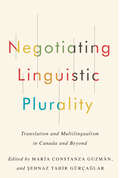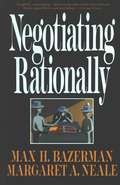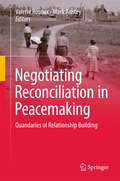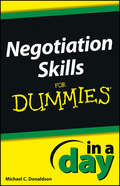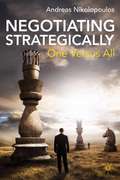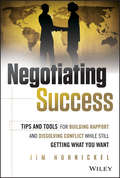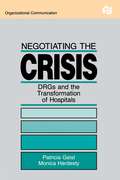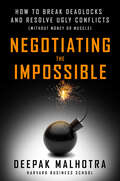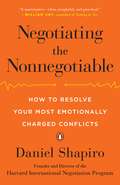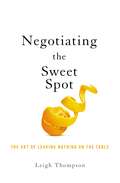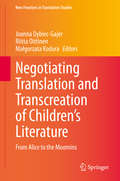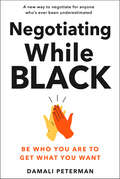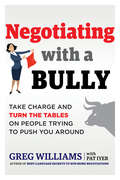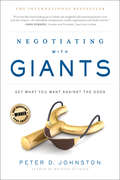- Table View
- List View
Negotiating (DK Essential Managers)
by DKImprove your negotiation skills and land the deal, promotion or project. Negotiation skills are essential for managing teams, persuading others and finding win-win solutions. This practical guide gives you the tools you need to improve your negotiation tactics.Whether you&’re new to negotiating or eager to enhance your existing skills, this is the guide for you. Inside you&’ll find: • Practical, &“how-to&” approach that teaches you the skills you need to run a project successfully. • New spreads on negotiation online rather than face to face. • Step-by-step instructions, tips, checklists and &“Ask yourself&” features show you how to make an impact. • Tables, illustrations, &“in-focus&” panels and real-life case studies demonstrate and explain problem-solving, and how to build confidence and get results. The illustrated guide to negotiating is the perfect tool for managers and business leaders. The slim, compact format allows you to use this book as an on-hand reference whenever you need advice on mitigating decision traps and impasses. You&’ll discover how to improve your negotiating skills by defining your style, preparing properly and designing your meeting structure, plus how to build relationships, develop trust, negotiate fairly, and tips on negotiating styles.This business management book is packed with step-by-step instructions, tips and checklists to show you how to persuade in business! Tables, illustrations and real-life case studies further explain how to build confidence and get results.Whether it&’s negotiating, managing people or improving your leadership skills, DK's Essential Managers series contains the know-how you need to be a more effective manager and hone your management style.
Negotiating 101: From Planning Your Strategy to Finding a Common Ground, an Essential Guide to the Art of Negotiating (Adams 101 Series)
by Peter SanderA quick-and-easy guide to core business and career concepts—no MBA required!The ability to negotiate a deal. Confidence to oversee staff. Complete, accurate monitoring of expenses. In today&’s business world, these are must-have skills. But all too often, comprehensive business books turn the important details of best practices into tedious reading that would put even a CEO to sleep. From hiring and firing to strategizing and calculating revenues, Negotiating 101 is an easy-to-understand roadmap of today&’s complex business world, packed with hundreds of entertaining tidbits and concepts that can&’t be found anywhere else. So whether you&’re a new business owner, a middle manager, or an entry-level employee, this 101 series has the answers you need to conduct business in a smarter way.
Negotiating Against the Odds
by Emily JonesDrawing on the experiences of more than 100 developing country negotiators and the insights of leading academic studies, this guide brings together practical advice and lessons on ways to negotiate effectively with larger parties, and avoid common pitfalls.
Negotiating and Influencing Skills: The Art of Creating and Claiming Value
by Dr Brad McRaeBased on the theoretical approach to cooperative negotiating skills developed at the Harvard Project on Negotiation, this book presents a two-step process towards mastery of negotiating and influencing skills. Step one involves the development of skills by means of interactive exercises and step two the application of these negotiating skills which have been carefully constructed to help the reader develop and broaden his or her negotiation style and become more flexible and fluid in approach. Negotiating and Influencing Skills addresses how to negotiate with difficult people and in difficult situations, and covers essential skills such as self-control, empathy and assertion in the negotiating process. Case studies a
Negotiating Cultural Encounters: Narrating Intercultural Engineering and Technical Communication, 1st Edition
by Han Yu Gerald SavageDiscusses the challenges of intercultural communication in engineering, technical, and related professional fields Given today's globalized technical and engineering environment, intercultural communication is an essential topic for engineers, other technical professionals, and technical communicators to learn. Engineering programs, in particular, need to think about how to address the ABET requirement for students to develop global competence and communication skills. This book will help readers learn what intercultural communication is like in the workplace--which is an important first step in gaining intercultural competence. Through narratives based on the real experiences of working professionals, Negotiating Cultural Encounters: Narrating Intercultural Engineering and Technical Communication covers a range of design, development, research, and documentation projects--offering an authentic picture of today's international workplace. Narrative contributors present firsthand experience and perspectives on the complexities and challenges of working with multicultural team members, international vendors, and diverse customers; additional suggested readings and discussion questions provide students with information on relevant cultural factors and invite them to think deeply and critically about the narratives. This collection of narratives: Responds to the need for updated firsthand information in intercultural communication and will help us prepare workplace professionals Covers various topics such as designing e-commerce websites, localizing technical documentation, and translating workplace safety materials Provides hands-on studies of intercultural professional communication in the workplace Is targeted toward institutions that train engineers for technical communication tasks in diverse sociocultural environments Presents contributions from a diverse group of professionals Recommends additional material for further pursuit A book unlike any other in its field, Negotiating Cultural Encounters is ideal for all engineering and technical communication professionals seeking to better communicate their ideas and thoughts in the multicultural workplaces of the world.
Negotiating For Dummies, 2nd Edition
by Michael C. Donaldson David FrohnmayerPeople who can't or won't negotiate on their own behalf run the risk of paying too much, earning too little, and always feeling like they're getting gypped. Negotiating For Dummies, Second, Edition offers tips and strategies to help you become a more comfortable and effective negotiator. And, it shows you negotiating can improve many of your everyday transactions-everything from buying a car to upping your salary. Find out how to: Develop a negotiating style Map out the opposition Set goals and limits Listen, then ask the right question Interpret body language Say what you mean with crystal clarity Deal with difficult people Push the pause button Close the deal Featuring new information on re-negotiating, as well as online, phone, and international negotiations, Negotiating for Dummies, Second Edition, helps you enter any negotiation with confidence and come out feeling like a winner.
Negotiating Genuinely: Being Yourself in Business
by Shirli KopelmanWe often assume that strategic negotiation requires us to wall off vulnerable parts of ourselves and act rationally to win. But, what if you could just be you in business? Taking a positive approach, this brief distills years of research, teaching, and coaching into an integrated framework for negotiating genuinely. One of the most fundamental and challenging battlegrounds in our work lives, negotiation calls on us to compete and cooperate to do our jobs well and achieve extraordinary results. But, the biggest challenge in a negotiation is to be strategic while also being real. Author Shirli Kopelman argues that this duality is both possible and powerful. In Negotiating Genuinely, she teaches readers how to reconcile the disparate hats that they wear in everyday life—with families, friends, and colleagues—bringing one "integral hat" to the negotiation table. Kopelman develops and shares techniques that illuminate this approach; exercises along the way help readers to negotiate more naturally, positively, and successfully.
Negotiating Identity in Modern Foreign Language Teaching
by Matilde GallardoThis edited book examines modern foreign language teachers who research their own and others’ experiences of identity construction in the context of living and teaching in UK institutions, primarily in the Higher Education sector. The book offers an insight into a key element of the educational and socio-political debate surrounding MFL in the UK: the teachers’ voices and their sense of agency in constructing their professional identities. The contributors use a combination of empirical research and personal reflection to generate knowledge about MFL teachers’ identity that can enhance how they are perceived in the social and educational establishments and raise awareness of key issues affecting the profession. This book will be of particular interest to language teachers, teacher trainers, applied linguists and students and scholars of modern foreign languages.
Negotiating in the Press: American Journalism and Diplomacy, 1918-1919 (Media & Public Affairs)
by Joseph R. HaydenNegotiating in the Press offers a new interpretation of an otherwise dark moment in American journalism. Rather than emphasize the familiar story of lost journalistic freedom during World War I, Joseph R. Hayden describes the press's newfound power in the war's aftermath -- that seminal moment when journalists discovered their ability to help broker peace talks. He examines the role of the American press at the Paris Peace Conference of 1919, looking at journalists' influence on the peace process and their relationship to heads of state and other delegation members. Challenging prevailing historical accounts that assume the press was peripheral to the quest for peace, Hayden demonstrates that journalists instead played an integral part in the talks, by serving as "public ambassadors." During the late 1910s, as World War I finally came to a close, American journalists and diplomats found themselves working in unlikely proximity, with correspondents occasionally performing diplomatic duties and diplomats sometimes courting publicity. The efforts of both groups to facilitate the peace talks at Versailles arose amidst the vision of a "new diplomacy," one characterized by openness, information sharing, and public accountability. Using evidence from memoirs, official records, and contemporary periodicals, Hayden reveals that participants in the Paris Peace Conference continually wrestled with ideas about the roles of the press and, through the press, the people. American journalists reported on an abundance of information in Paris, and negotiators could not resist the useful leverage that publicity provided. Peacemaking via publicity, a now-obscure dimension of progressive statecraft, provided a powerful ideological ethos. It hinted at dynamically altered roles for journalists and diplomats, offered hope for a world desperate for optimism and order, and, finally, suggested that the fruits of America's great age of reform might be shared with a Europe exhausted by war. The peace conference of 1919, Hayden demonstrates, marked a decisive stage in the history of American journalism, a coming of age for many news organizations. By detailing what journalists did before, during, and after the Paris talks, he tells us a great deal about how the negotiators and the Wilson administration worked throughout 1919. Ultimately, he provides a richer integrative view of peacemaking as a whole. An engaging analysis of diplomacy and the Fourth Estate, Negotiating in the Press offers a fascinating look at how leading nations democratized foreign policy a century ago and ushered in the dawn of public diplomacy.
Negotiating Life
by Jeswald W. SalacuseA complement to the successful The Global Negotiator: Making, Managing, and Mending Deals Around the World in the Twenty-First Century (Palgrave, 2003), Salacuse's new work is a comprehensive and easy-to-understand look at negotiation in everyday life. Drawing from his extensive experience around the world, Salacuse applies such large-scale examples as the Arab-Israeli conflicts or those in Berlin and shows us how to use such strategies in our own lives, from family and home life, to business and the workplace, even to our own thoughts as we negotiate compromises and agreement with ourselves. Arguing that life is really a series of negotiations, deal making, and diplomacy, Salacuse gives readers the tools to make the most of any situation.
Negotiating Linguistic Plurality: Translation and Multilingualism in Canada and Beyond
by María Constanza Guzmán and Şehnaz Tahir GürçağlarCultural and linguistic diversity and plurality are seen as markers of our time, linked to discourses about citizenship and cosmopolitanism in the context of economic globalization in the late twentieth century. It is often monolingualism, however, that informs understanding and policies regulating the relationship between languages, nations, and communities.Grounded by the idea of language as lived experience, Negotiating Linguistic Plurality assumes linguistic plurality to be a continuing human condition and offers a novel transnational and comparative perspective on it. The essays featured cover concepts and praxis in which linguistic plurality surfaces in the public sphere through institutional and individual practices. The collection adopts a critical view of language policies and foregrounds distances and dissonances between policy and language practices by presenting lived experiences of multilingualism. Translation, seen as constitutive to the relations inherent to linguistic plurality, is at the core of the volume. Contributors explore a range of social and institutional aspects of the relationship between translation and linguistic plurality, foregrounding less documented experiences and minoritized practices.Presenting knowledge that spans regions, languages, and territories, Negotiating Linguistic Plurality is a thoughtful consideration of what constitutes language plurality: what its limits are, as well as its possibilities.
Negotiating Rationally
by Max H. BazermanDraws on a study of the irrational behavior of ten thousand executives and student leaders to help managers and negotiators check their personal biases and assumptions in order to reach the best agreements possible.
Negotiating Reconciliation in Peacemaking
by Valerie Rosoux Mark AnsteyThis book offers a unique approach to reconciliation as a matter for negotiation, bringing together two bodies of theory in order to offer insights into resolving conflicts and achieving lasting peace. It argues that reconciliation should not be simply accepted as an 'agreed-upon norm' within peacemaking processes, but should receive serious attention from belligerents and peace-brokers seeking to end violent conflicts through negotiation. The book explores different meanings the term 'reconciliation' might hold for parties in conflict - the end of overt hostilities, a transformation in the quality of relations between warring groups, a vehicle of accountability and punishment of human rights abusers or the means through which they might somehow acquire amnesty, and as a means of atonement and to material reparation. It considers what gives energy to the idea of reconciliation in a conflict situation--why do belligerents become interested in settling their differences and changing their attitudes to one another? Using a range of case studies and thematic discussion, chapters in this book seek to tackle these tough questions from a multidisciplinary perspective. Contributions to the book reveal some of the complexities of national and international reconciliation projects, but particularly diverse understandings of reconciliation and how to achieve it. All conflicts reflect unique dynamics, aspirations and power realities. It is precisely because parties in conflict differ in expectations of reconciliation outcomes that its processes should be negotiated. This book is a valuable resource for both scholars and practitioners engaged in resolving conflicts and transforming fragmented relations in conflict and post-conflict situations.
Negotiating Skills In a Day For Dummies
by DonaldsonGet the know-how to successfully negotiate to get what you want--in a day!Negotiation Skills In A Day For Dummies offers expert guidance on executing the essential skills of successfully and diplomatically negotiating for the outcomes you desire. Preparing to negotiateSetting clear goals and limits Improving your listening skills and asking the right questionsCommunicating clearlyMaintaining emotional distance from the negotiationClosing the dealThis e-book also links to an online component at dummies.com that extends the topic into step-by-step tutorials and other "beyond the book" content.
Negotiating The Social Borderlands: Portraits of Young People with Disabilities and Their Struggles for Positive Relationships
by Janet SauerThis book provides readers with narratives of the lives of three young people with significant disabilities. The author uses portraiture to narrate the stories of three young people and to capture the myriad dimensions of each unique individual. These portraits expose a balance between empirical description and aesthetic expression and provide a singular view into the nuances and complexities of each young person's life, while depicting their unique social contexts and how they fit within those milieux. Never losing sight of the dimensions of the selves of these notable young people and the contexts in which they exist, the author presents the qualitative techniques of inquiry she used to examine the complexities involved in the co-constructions of meaning among the young people and their communication partners. Without wavering, she explores their deep relationships and the contexts where positive reciprocal relationships developed between young people with disabilities and nondisabled people and how these relationships evolved from the perspectives of the participants. Negotiating the Social Borderlands, an unapologetic presentation of a remarkable set of portrait narratives, is written for a broad audience and, thus, offers an inherently complex and sensitive portrayal of three personal stories in which a variety of contextualized issues can be examined and discussed in light of each readers' practices, policies, and perspectives.
Negotiating Strategically
by Andreas NikolopoulosNegotiation is a key part of daily lives, but learning how to negotiate successfully is a valuable skill. The author provides a tool kit for negotiation, demonstrating new methods and giving practical advice.
Negotiating Success
by Jim HornickelHow to execute win-win negotiations every time, in business and in life Negotiating Success provides expert guidance on how to improve strategies and outcomes in negotiating anything in professional and personal life. With a constant focus on the mind, body, and spirit of the professional negotiator, this easy-to- ready text brings a holistic approach to the hard and soft skills needed for ethical negotiations. The result is a better understanding of how to negotiate successfully for mutual benefit by all parties.Offers tips and tools, such as how to use positive psychology to unite your team, emotional intelligence for successful negotiation, and how to minimize conflictSpells out the six principles of ethical influenceWritten by Jim Hornickel, the founder of Bold New Directions, a transformational learning organization that provides training, coaching, retreats, and keynotes across the world, specializing in negotiation, leadership, communication, presentation, and corporate trainingNegotiating Success delivers an unparalleled blend of practical and explicit steps to take to achieve win-win negotiations, every time.
Negotiating the Crisis: Drgs and the Transformation of Hospitals (Routledge Communication Series)
by Patricia Geist Monica HardestyIn 1984 Congress revamped Medicare to save a financially distraught health care system, thus transforming the hospital as an organization. Diagnosis Related Groups (DRGs) -- the cornerstone of this extensive reorganization -- have triggered repercussions that are still adversely affecting health care professionals. This volume cuts to the heart of this crisis, examining the difficulties and foibles of going from DRG Legislation to DRG practices and giving voice to the professionals who must carve out a new reality under DRGs. It exposes the disputes between the various professional groups -- administrators, physicians, and nurses --over the implementation of DRGS, and how these professionals maneuver to manage the health service problems created by the policy. The book's authors provide an insightful analysis of the way policy innovations can wreak havoc on an organization and how professionals working together eventually negotiate order out of the chaos of change. The volume's narrative style of research is one feature that makes the presentation of the authors' findings unique from other works on Medicare legislation. Additionally, the book offers a case study approach to communication and sociological matters of a significant health care issue.
Negotiating the Impossible: How to Break Deadlocks and Resolve Ugly Conflicts (without Money or Muscle)
by Deepak Malhotra“Filled with great strategies you can immediately put to use in your business and personal lives . . . extremely entertaining, thought-provoking.” —Tyra Banks, CEO, TYRA Beauty, and creator of America’s Next Top ModelSome negotiations are easy. Others are more difficult. And then there are situations that seem completely hopeless. Conflict is escalating, people are getting aggressive, and no one is willing to back down. And to top it off, you have little power or other resources to work with. Harvard professor and negotiation adviser Deepak Malhotra shows how to defuse even the most potentially explosive situations and to find success when things seem impossible.Malhotra identifies three broad approaches for breaking deadlocks and resolving conflicts, and draws out scores of actionable lessons using behind-the-scenes stories of fascinating real-life negotiations, including drafting of the US Constitution, resolving the Cuban Missile Crisis, ending bitter disputes in the NFL and NHL, and beating the odds in complex business situations. But he also shows how these same principles and tactics can be applied in everyday life, whether you are making corporate deals, negotiating job offers, resolving business disputes, tackling obstacles in personal relationships, or even negotiating with children.As Malhotra reminds us, regardless of the context or which issues are on the table, negotiation is always, fundamentally, about human interaction. No matter how high the stakes or how protracted the dispute, the object of negotiation is to engage with other human beings in a way that leads to better understandings and agreements. The principles and strategies in this book will help you do this more effectively in every situation.“This book is magic for any deal maker.” —Daniel H. Pink, New York Times-bestselling author
Negotiating the Nonnegotiable: How to Resolve Your Most Emotionally Charged Conflicts
by Daniel Shapiro"A masterpiece."--William Ury, coauthor of Getting to YesIn this landmark book, world-renowned Harvard negotiation expert Daniel Shapiro introduces a groundbreaking, step-by-step method to resolve your most difficult conflicts. Find out how to successfully resolve your most emotionally charged conflicts. This indispensable guide reveals the five hidden emotional forces that strain your relations and block agreement: vertigo, repetition compulsion, taboos, assault on the sacred, and identity politics. The moment you feel attacked, these forces transform your conflict into an adversarial battle, turning even a straightforward disagreement into an emotional uproar. In Negotiating the Nonnegotiable, you will learn a powerful, proven approach to overcome these forces, reconcile your relations, and reach agreement in even your most challenging personal and professional disputes.From the Hardcover edition.
Negotiating the Sweet Spot: The Art of Leaving Nothing on the Table
by Leigh ThompsonEverybody negotiates at various points every day, be it in life or business, and it’s important to get it right. Negotiating the Sweet Spot walks people of all skill and experience levels through simple and proven techniques that are sure to result in better outcomes for all parties and that uncover the hidden value that exists in any negotiation. On average, people leave about 20 percent of potential mutual gains untapped in any negotiation. This is akin to taking 20 percent of the value in any deal and dumping it into a garbage canister. Finding that hidden 20 percent, the “sweet spot”, is a skill that takes practice but is also one that anybody can learn. In Negotiating the Sweet Spot, Leigh Thompson offers surefire best practices and tools to use in daily negotiations and conflict situations. She calls these strategies “hacks” because they work but don’t require a lot of investment, training, expense, and time. You don’t have to be a CEO, senior VP, or regional brand manager to learn how to find the sweet spot in life’s negotiations. Benefits include learning the following: * Understanding where the sweet spot is in the deals you negotiate * Adopting a big-picture mind-set when approaching any negotiation * Seeing negotiations less as win-lose battles and more as opportunities to use problem-solving skills * Utilizing a tool kit of “hacks” that will work in any negotiation and have been proven effective by a top expert in the field
Negotiating Translation and Transcreation of Children's Literature: From Alice to the Moomins (New Frontiers in Translation Studies)
by Joanna Dybiec-Gajer Riitta Oittinen Małgorzata KoduraThis book offers fresh critical insights to the field of children’s literature translation studies by applying the concept of transcreation, established in the creative industries of the globalized world, to bring to the fore the transformative, transgressional and creative aspects of rewriting for children and young audiences. This socially situated and culturally dependent practice involves ongoing complex negotiations between creativity and normativity, balancing text-related problems and genre conventions with readers’ expectations, constraints imposed by established, canonical translations and publishers’ demands. Focussing on the translator’s strategies and decision-making process, the book investigates phenomena where transcreation is especially at play in children’s literature, such as dual address, ambiguity, nonsense, humour, play on words and other creative language use; these also involve genre-specific requirements, for example, rhyme and rhythm in poetry. The book draws on a wide range of mostly Anglophone texts for children and their translations into languages of limited diffusion to demonstrate the numerous ways in which information, meaning and emotions are transferred to new linguistic and cultural contexts. While focussing mostly on interlingual transfer, the volume analyses a variety of translation types from established, canonical renditions by celebrity translators to non-professional translations and intralingual rewritings. It also examines iconotextual dynamics of text and image. The book employs a number of innovative methodologies, from cognitive linguistics and ethnolinguistics to semiotics and autoethnographic approaches, going beyond text analysis to include empirical research on children’s reactions to translation strategies. Highlighting the complex dynamics at work in the process of transcreating for children, this volume is essential reading for students and researchers in translation studies, children’s fiction and adaptation studies.
Negotiating While Black: Be Who You Are to Get What You Want
by Damali PetermanA real-world, one-of-a-kind resource for anyone who has ever been underestimated, overlooked, or misunderstood at the negotiating table.There&’s no shortage of negotiation books that advise you to &“get to yes,&” urge you to &“never split the difference,&” and push you to &“ask for more.&” But these one-size-fits-all negotiation techniques disregard the reality of our complex, multifaceted, multicultural world, where snap judgements are made based on perceived differences. When bias lies behind every negotiation, the only constant is you. Learn to leverage who you are—and gain the upperhand.Negotiating While Black is the indispensable guide that lawyer and mediator Damali Peterman wishes had existed earlier, as she navigated workplaces as the only Black woman, advocated for her children attending predominantly white schools, and mediated countless other bias-ridden settings. Drawing on these experiences together with decades of wisdom as a trained negotiator in high-stakes situations, Peterman has developed successful strategies notably absent from other top negotiation books—tactics that work for all people, no matter your identity. From the Foundational Five skills to the Negotiation Superpowers, these tried-and-true techniques will lift you to the next level of winning.Whether negotiating in the boardroom or in everyday life, Peterman shows how everything is potentially up for discussion—even when stakes (and emotions) are high. You can&’t control bias, but by being yourself, you actually have a better shot at getting what you want. Because when you arrive prepared and proud of who you are, you&’ll reap the rewards.
Negotiating with a Bully: Take Charge and Turn the Tables on People Trying to Push You Around
by Williams GregEveryone has felt bullied at some point in their lives, whether by a family member, childhood acquaintance, colleague, boss, or client. You know you have been bullied when you feel pressured, demeaned, and angered. You walked away from a negotiation feeling like you lost ground. You gave into demands and agreed to something that was not in your best interests. And you resented the way you felt. <P><P>Negotiating with a Bully will teach you how to skillfully deal with bullies in different forms and environments. You&’ll explore the mindset of a bully and understand the motivations and behavior so that you can gain an advantage over him or her.Negotiating with a Bully will give you the answers you need to become a more effective negotiator when you are confronted by a bully. <P><P>You will learn how to quickly and easily: Recognize the tactics of a bully—before you yield ground in a negotiation.Employ an arsenal of negotiation strategies, including some you may have never considered using before.Plan a negotiation with a bully so that you feel prepared to tackle the situation.Interpret the body language of the bully—and his or her target—to better assess his or her intentions.
Negotiating with Giants: Get what you want against the odds
by Peter D. JohnstonHOW DO YOU NEGOTIATE with Wal-Mart? With America's President over going to war? A pay raise from an intimidating boss? More money for a struggling start-up? Sweeping social change? Your survival if you're taken hostage by an armed killer? In this award-winning bestseller, you will travel across time through riveting, real-life David & Goliath stories uncovering the secrets and strategies of successful smaller players so you, too, can get what you want against the odds.
